
Zero Hunger
INTRODUCTION:
Sustainable Development Goal (SDG) 2 aims to ensure food security and find long-term solutions to abolish all types of hunger by 2030. The goal is to guarantee that everyone worldwide can access enough wholesome food to maintain a healthy lifestyle. Better food access and extensive promotion of sustainable agriculture are necessary to meet this goal. It is estimated that 690 million people, or 8.9 percent of the world’s population, are undernourished. By 2030, there will be more than 840 million hungry people worldwide, or 9.8 percent of the entire population, if current trends continue. In the 2020 report “The State of Food Security and Nutrition in the World,” FAO estimates that 189.2 million people in India are malnourished, accounting for 14% of the Indian population. Additionally, 51.4% of women between the ages of 15 and 49 are anaemic. The report also
states that 20% of children under five in India suffer from wasting, and 34.7% are stunted. Malnourished children show a high mortality risk from common illnesses like diarrhoea, pneumonia, and malaria. India is ranked 101 out of 116 countries in the Global Hunger Index 2020 based on the prevalence of stunting and wasting in children, the mortality rate of children under the age of 5, and the percentage of the population who is malnourished.
Zero Hunger campaign on the Nitte University campus inspires action to mitigate food wastage on campus. Through moderated discussions with university students using various methods of communication such as art, invention and innovation, students motivate their peers to join the movement of Zero Hunger. Also, the emphasis is that campus food options should be sustainable, nutrient-dense, and inexpensive. Campus food production and fresh food markets on campus are practised and encouraged.
World Food Safety Day Oration 2021
As a multidisciplinary University offering a “master” Programme in Food Safety and Biotechnology, Nitte University in Mangalore considered it very important to highlight the importance of food safety by celebrating World Food Safety Day on June 7 2021. The event was organized by Dr Iddya Karunasagar, Adviser (Research & Patents), Nitte (DU), and moderated by Dr Indrani Karunasagar, Director, DST NU- TEC, Nitte (DU). Professor Alan Reilly, the former CEO of the Food Safety Authority of Ireland, delivered an inspirational speech that served as the event’s high point. In his speech, Professor Reilly discussed “Strengthening National Food Safety Systems - Challenges in the era of Covid-19. He outlined the theme of 2021 World Food Safety Day, “Safe food now for a healthy tomorrow”, and explained how food safety is a shared responsibility of all operators in the food chain from primary production to final consumption. Food safety challenges during COVID-19, particularly with evidence emerging regarding the role of aerosols in the spread of SARS-CoV2, were elaborated, and the associated risks to food processing personnel. However, he emphasized that food has not been implicated in the transmission of COVID-19. In addition, Professor Reilly addressed the need to use a One Health strategy to handle food safety issues in light of the rising zoonotic diseases as a significant public health concern. He made a passing reference to the necessity of the One Health approach in minimizing antimicrobial resistance. Eat healthy: Diabetic Diet Program Jacob, Adjunct Professor, Central Research Lab, KSHEMA, Nitte (DU), resource persons presented excellent insights into how simply eating the healthiest food in moderation and sticking to regular mealtimes can help control diabetes. The topics covered in the discussion included how human dietary habits evolved and their effects, reasons for the escalation of diabetes amongst Indians, Diabetic diet foods, plans, and recipes. They emphasized the significance of a Nitte Centre for Integrative Medicine and Research (NU-CIMR) organized a three-day online workshop on the ‘Diabetic Diet Program’ from July 13 to July 15 2021. The workshop’s objective was to increase public awareness of dietary interventions, diabetic-friendly food, diabetic menu plan, and diabetic diet recipes. Dr. Arun Thejaus KP, Asst. Professor and in- charge, NU-CIMR, Nitte (DU), and Dr Praveen While welcoming the gathering, the Vice Chancellor of Nitte (DU), Prof Dr Satheesh Kumar Bhandary, highlighted the measures to ensure that safe and nutritious food is delivered to the students residing in hostels on the University campus. The oration was attended by faculty, students, food industry representatives, and scientists from other disciplines across the country. https://www.fao.org/fao-who- codexalimentarius/news-and-events/news details/en/c/1411451/
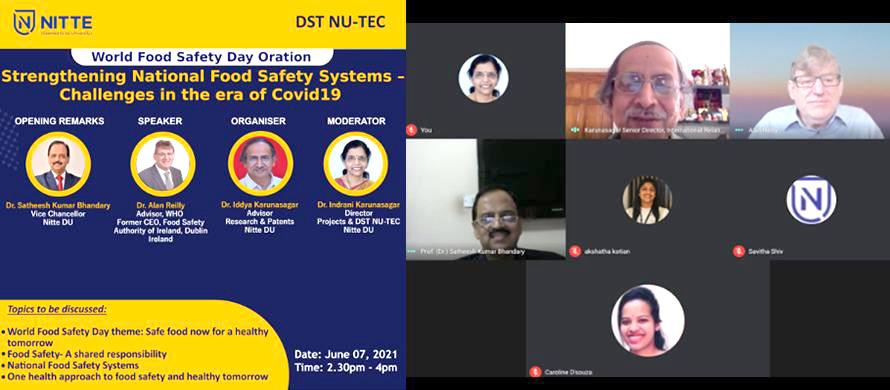
Eat healthy: Diabetic Diet Program
Nitte Centre for Integrative Medicine and Research (NU-CIMR) organized a three-day online workshop on the ‘Diabetic Diet Program’ from July 13 to July 15 2021. The workshop’s objective was to increase public awareness of dietary interventions, diabetic-friendly food, diabetic menu plan, and diabetic diet recipes. Dr. Arun Thejaus KP, Asst. Professor and in- charge, NU-CIMR, Nitte (DU), and Dr Praveen Jacob, Adjunct Professor, Central Research Lab, KSHEMA, Nitte (DU), resource persons presented excellent insights into how simply eating the healthiest food in moderation and sticking to regular mealtimes can help control diabetes. The topics covered in the discussion included how human dietary habits evolved and their effects, reasons for the escalation of diabetes amongst Indians, Diabetic diet foods, plans, and recipes. They emphasized the significance of a Diabetic diet plan involving key elements such as fruits, vegetables, whole grains, plant-based proteins, fat, and calorie reduction in diabetic management. These sessions gave diabetes patients, risk groups, and caregivers a wealth of information.

Eat right: We are what we eat
The NSS and the Dental Education Units of AB Shetty Memorial Institute of Dental Sciences conducted a guest lecture by Nutritionist Mrs Jayalaxmi Shenoy from Bangalore titled “EAT RIGHT: WE ARE WHAT WE EAT” on 15.09.2021 at Avishkar Hall. The program was conducted as part of the Poshan Maah Calendar 2021 - Converging towards a healthy walk through life, as directed by the Government of India, NITI Aayog’s, POSHAN Abhiyaan or National Nutrition Mission from 1st to 30th September 2021.

Dr Kumuda Rao, Program Officer, NSS unit, was the MC. The program began with a prayer by Dr Aruna Kamath invoking the divine blessings of the Almighty. Dr Supriya Bhat introduced the speaker. The program was presided over by Prof. Dr US Krishna Nayak, Principal & Dean. Dr Rahul Bhandary addressed the gathering. Dr Biju Thomas presented the memento to the speaker. Dr Avaneendra Talwar proposed the vote of thanks. The program concluded with the National Anthem.
National Nutrition Week Celebration

National Nutrition Poshan Maah”
National Nutrition Mission “Rashtriya Poshan Maah” was observed on September 30 2021. The program aimed to create awareness about society’s nutritional levels and imbibe a sense of social responsibility, inclusion, and volunteerism. Students were asked to donate food grains and vegetables to the needy. The children of nearby government schools received the donations of goods that were thus gathered. Students of Class 8 exhibited different food items that are used in our day-to-day life and were briefed about the nutritional as well as medicinal value of each. Students were taken on a field trip around the campus to study medicinal plants and their uses.
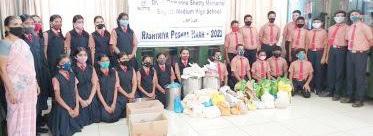
World Food Day 2021- Our Actions are Our Future
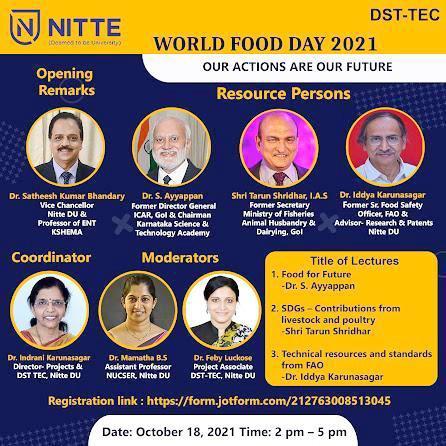
A virtual course on Microbiological Risk Assessment in Food Safety
Nitte Deemed to be University and the University of Maryland, USA jointly delivered the American Society for Microbiology (ASM)-Indo-US Science & Technology Forum (IUSSTF) Virtual Course on “Microbiological Risk Assessment in Food Safety” from 13th to 17th December 2021. The week- long course was part of the approved activities under the ASM-IUSSTF Professorship awarded to Dr Abani Pradhan of the University of Maryland. The programme was coordinated by Dr Iddya Karunasagar, Adviser (Research & Patents), Nitte (DU), Dr Indrani Karunasagar, Director, DST NU-TEC, Nitte (DU), and Dr Mamatha B, Asst. Professor, NUCSER The ASM-IUSSF-sponsored course consisted of lectures on risk assessment models, Monte Carlo simulations, and the development of risk estimates. Dr Abani Pradhan delivered several lectures on these aspects. In contrast, Dr Iddya Karunasagar (a former FAO Senior Food Safety Officer) delivered lectures to illustrate how risk assessments have been used to develop International Food Safety Standards by the Codex Alimentarius Commission. The course attracted 324 registered participants that included faculty and students from Nitte (DU), Pondicherry University, Indian Agricultural Research Institute, Indian Council of Agricultural Research, State Fisheries Universities in Tamil Nadu and Kerala, National Aquatic Resources Research and Development Agency (NARA), Sri Lanka, Food Safety and Standards Authority of India and number of other academic institutions in India.
Sustainable Development Goal- Lecture Series POSHAN- Food be thy medicine and medicine be thy food
Sustainable development goals (SDG) are a collection of 17 interlinked global goals designed to be a “blueprint for achieving a better and more sustainable future for all.” Therefore, aspiring medical professionals must improve education that focuses on the SDGs. Focusing on the health aspects of the goals, Nitte (Deemed to be University) conducted a lecture series on the SDG. The Department of Public Health, KSHEMA, in collaboration with the Department of Prosthodontics, ABSMIDS, hosted a webinar called POSHAN. “Food is thy medicine and medicine be thy food” was the theme for the event.The webinar was held live on YouTube from 12:00 PM to 1:00 PM on November 10, 2021, and received over 600 views. The opening remarks were given by Prof (Dr) Alka Kulkarni, Registrar, Nitte (Deemed to be University). The speech discussed the need for healthy diets and their connection with health outcomes. In the modern world, consumerist behaviour took a significant share in food habits, mainly served with high-calorie and fatty food. This behaviour is significantly visible in the morbidity charts. Non-communicable diseases are the main after-effects of this lifestyle. She reminded every youngster of physical exercise and mental stability through meaningful speech. The prevalence of metabolic disease and age- related disorders has dramatically increased due to the modern lifestyle, which is defined by an imbalanced diet, inadequate physical activity, and environmental contaminants.
The topic was explained by Dr Arun Thejus, Associate professor and in charge of the Nitte Centre for Integrative Medicine and Research, where he mentioned the relation of the food habits of homo sapiens to anthropology. The “Role of the gut microbiome in health & diseases” session was an eye-opener to know the importance of fibre-rich food in human existence. Microbes have the power to influence our physiology, both in health and disease, significantly. They contribute to metabolic processes, provide defence against pathogens, train the immune system and, through these fundamental processes, influence most of our physiologic processes directly or indirectly. There is a drastic change in nutrition intake in homo sapiens. In ancient times, human nutrition intake was rich in micro and macronutrients. After the agricultural revolution, the scenario changed only to carbohydrate-rich food supplements, mainly rice, wheat, and other crops. The epidemiological transition is evident from communicable to non- communicable diseases.
“Let thy food be thy medicine” quote by Hippocrates emphasizes nutrition in curing diseases. The most successful example is the association between an unhealthy diet and chronic diseases like obesity, cardiovascular diseases, type 2 diabetes, and co-morbidities. And on the other hand, the association of a healthy diet decreases the risk of conditions like osteoarthritis, multiple sclerosis, depression, etc. The transition is clear from the change of eras from the Paleolithic to Mesolithic to Neolithic ages. As per the shreds of evidence, life expectancy and standard of living have gained significance, resulting in the Industrial revolution.
The calorie intake should be managed with appropriate p hysical activities and a controlled diet. The session clarified the distribution of bacteria in the body and how to manage it. Dr Arun explained the works of the Nitte Centre for Integrative Medicine and Research and its contribution to the Nitte (DU).
Ms Shifa Hegde delivered the vote of thanks to concluding the programme. More emphasis on the SDG indicators was made during the speech. With a focus on climate change, urbanization, global warming, and the rising usage of plastics and fossil fuels, the series’ insights can help listeners lead better lives.
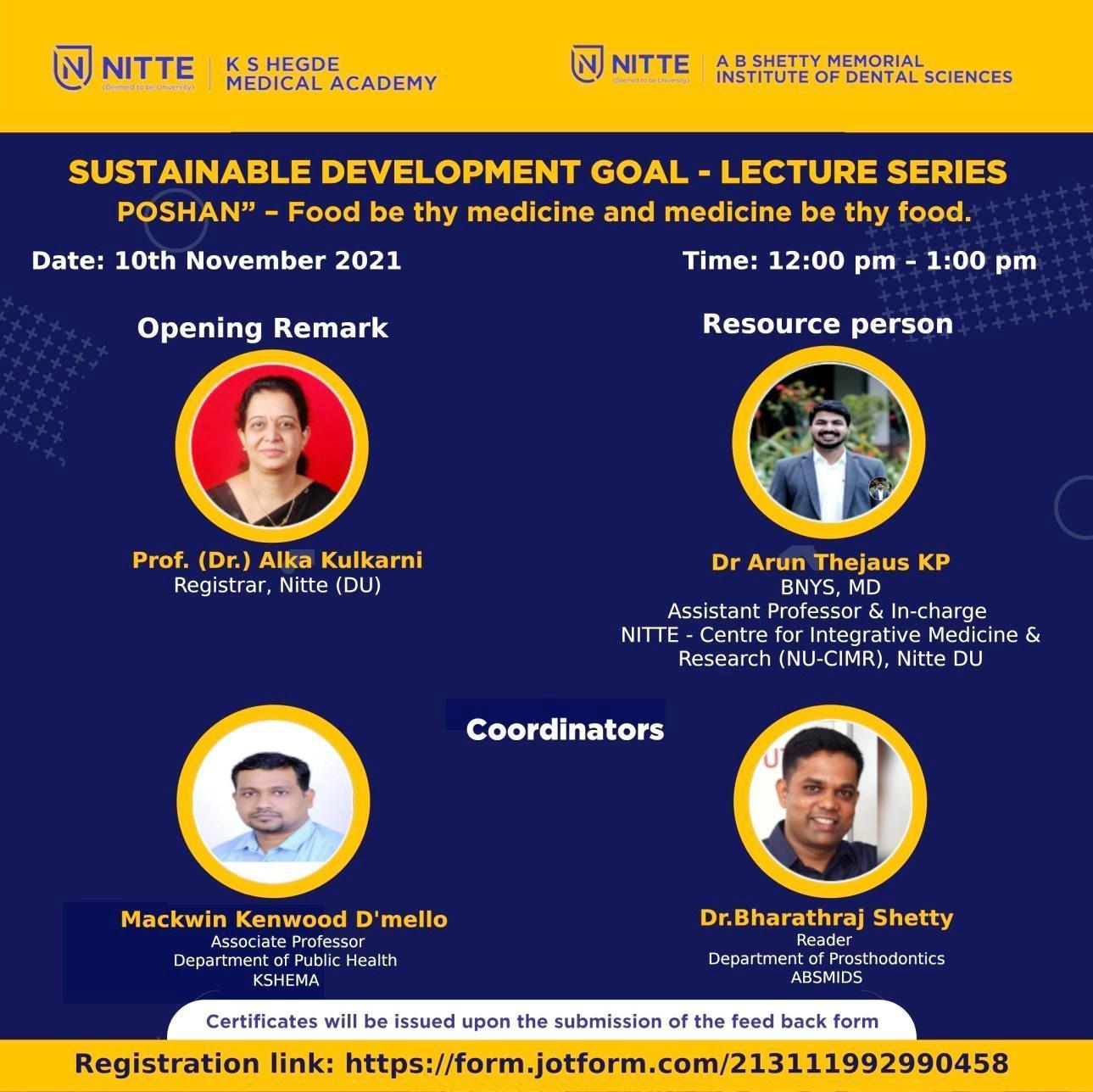
Lecture series on Sustainable Development Goal
Nitte (DU) Technology Transferred for Commercialization
On February 25 2021, The Technology Transfer Agreement was signed between Nitte (Deemed to be University) and M/S Eshanya Beverages for the commercialization of patented technology for the production of beverages from betel leaves. Mr H.S. Sandeep Kumar, Promotor and Director, Eshanya Beverages, Dr Alka Kulkarni, Registrar, Nitte (DU), signed the agreement. The Chancellor of Nitte (DU), Shri Vinay Hegde, handed over the technology package to Eshanya Beverages in the presence of Dr Shantharam Shetty, Shri Vishal Hegde, Pro Chancellors, Dr Satheesh Kumar Bhandary, Vice Chancellor, Shri Rajendra, Finance Director; Dr Iddya Karunasagar, Advisor, Research and Patent; Dr Indrani Karunasagar, Director, DST NUTEC; Dr Prakash, Dean, K.S. Hegde Medical Academy and Dr Mamatha, BS, Assistant Professor and developer of the technology for beverages from betel leaves. The Department of Science and Technology (DST) Technology Enabling Center at Nitte (DU) (NUTEC) has the mandate to facilitate the development and transfer of technologies for commercialization. DST NUTEC facilitated the development of technology for producing beverages from betel leaves, which are rich in antioxidants and antimicrobial molecules. Betel leaves are a natural appetizer, digestive, mild stimulant, aphrodisiac, and refreshing mastication. The technology was developed, favouring the requirements of consumers. Before being commercially released, the product was evaluated by a team of organoleptic assessors and an analytical laboratory. The product is expected to reach the market in a couple of months. Thus M/S Eshanya Beverages is also exploring the overseas market for the products.
Nitte (DU) has several technologies ready for commercialization in the food industry, environmental management and aquaculture. The Vice-Chancellor, Dr Satheesh Kumar Bhandary, informed that the details of technologies are available on the Nitte (DU) website, and any Startup or MSMEs or companies interested in the technologies may contact the University.
Webinar On World Food Day
DST Technology Enabling Centre in collaboration with Nitte University Centre for Science Education and Research organized a webinar on the occasion of World Food day 2021. The international event was a clarion call for collective efforts towards combating issues of hunger, food insecurity and food wastage. The theme for World Food day 2021 was ‘Our actions are our future’. The key note speakers for the webinar were Padmashri Dr S Ayyappan, Former Director General ICAR & Chairman of Karnataka Science and Technology Academy, ShriTarun Shridhar, Former secretary, Ministry of Fisheries, Animal Husbandry and Dairying, GOI and Dr IddyaKarunasagar, Advisor (Research & Patents). Dr IndraniKarunasagar accorded welcome and introduced the speakers to the audience. Hon’ble Vice-Chancellor, Nitte (DU) Prof. Dr Satheesh Kumar Bhandary, in his opening remarks highlighted the requirement for collective and comprehensive work to eradicate hunger and nutritional deficiencies. Sustainable system is a requirement to tackle the global hunger index as well as other health related burden, said Dr S Ayyappan. He spoke on aspects of better production, nutrition, better environment for a better life. He discussed the facts and presented statistics on Indian farming including strategies to improve it. This could result in enhancing farmers income through integrated farming by clustering of land, climate smart farming, agripreneurship, water footprint, innovation in water management, use of low cost technologies, use of nano fertilizers, production of high value crops, urban agriculture,cultivation floating horticulture, vertical farming, aquaponics, organic farming, biofortification, agritourism etc. Dr IddyaKarunasagar former senior Food Safety Officer, FAO explained about technical resources and standards available from FAO, their roles and responsibilities. He highlighted the various flagship publications of FAO that covers global data on food sector, process of scientific risk assessment to set the food standards, International agreements and guidelines regarding various aspects of food sector. Shri Tarun Shridhar reiterated the theme of the world food day and wanted concerted action to protect the livestock industry. He opined that livestock play a major role in the economic prosperity. To add on, he said livestock sector runs throughout the year and provides nutritional security and can also generate value added products. Yet its role is not recognised sufficiently.
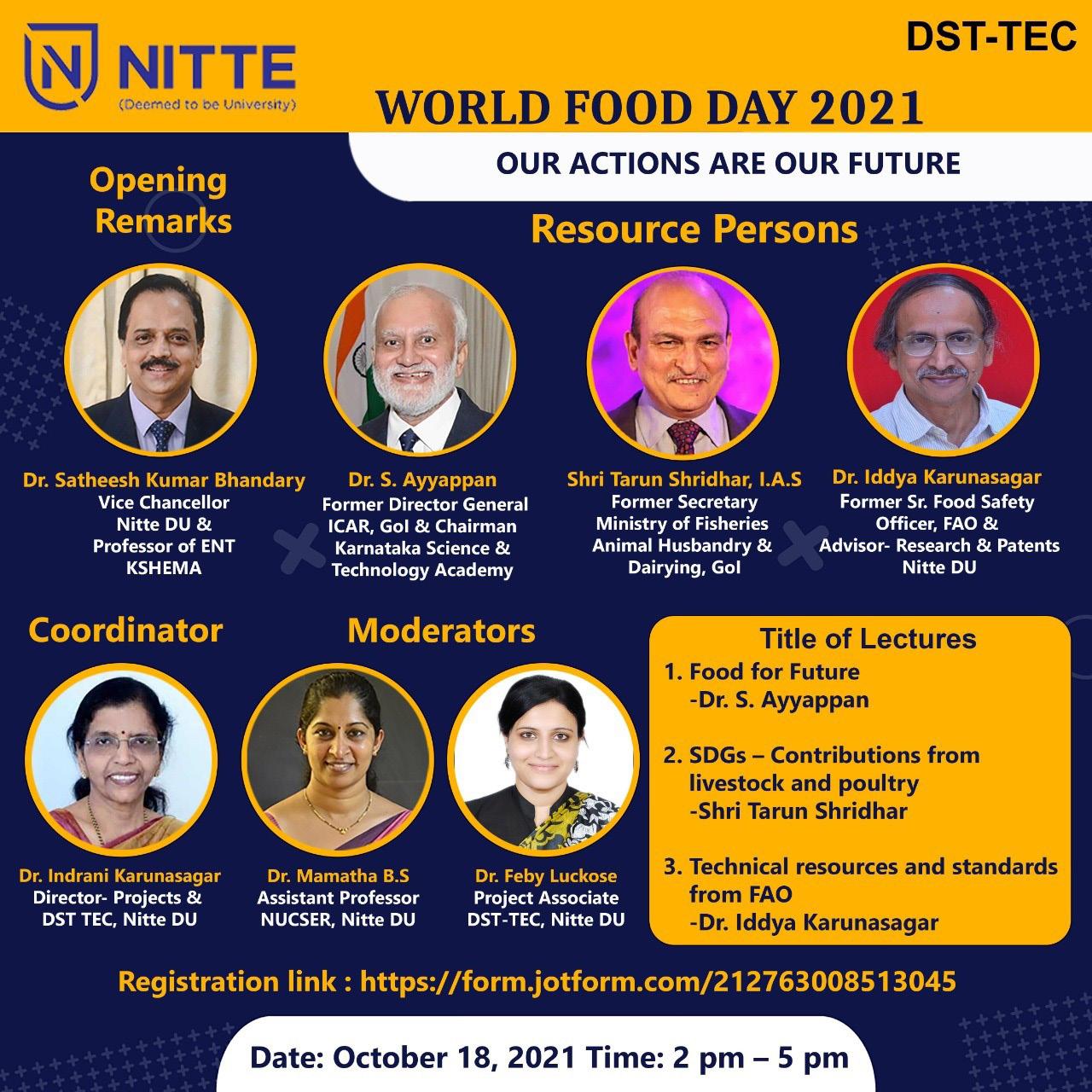
We are in the period of sustainable development. Seven of the seventeen goals are pertaining to agriculture. Food and agriculture is everybody’s business and food production is the key fuel for the entire economy. However, one should not forget carbon footprint that is left for every ton of food we produce. The dialogue between health and food sector should improve in bringing innovative solutions thereby promoting “Make in India” motto - Dr S Ayyappan
“FAO has been in the forefront in helping countries to fight hunger and malnutrition, development of international agreements and guidelines for sustainable development of agricultural ecosystem. Codex Alimentarius Commission and IPPC standards have become almost mandatory due to the status given to them in WTO and SPS agreement” - Dr IddyaKarunasagar
Chronic and acute hunger levels are rising. A serious introspection of the past actions are required to tackle this. Livestock sector can play a crucial role since hunger is still a rising issue. 60% of the dietary protein is from livestock in developed countries and 23% in developing countries implying lack of nutritious food for the latter. One needs to understand the big difference between food and nutrition security” - Shri Tarun Shridhar
Breastfeeding Week
As a part of World Breast Feeding Week Celebration 2022, the Department of Child Health Nursing, NUINS conducted a Mass Health Education Program on ‘Breast Feeding’ at Pandeshwar Government School, Pandeshwar. The program was held on 6th August 2022 from 10:00 am to 2:00 pm. A health talk on ‘Breast Feeding’ was given by Mrs. Jeevitha Alva, Asst. Professor and presentation by Prof. Sujatha R, Head, Dept. of Child Health Nursing.
The program started with a brief introduction by Mrs. Anupama, Anganawadi supervisor. Later the faculty gave health education briefing on techniques, positions and the importance of exclusive breastfeeding and clarified doubts. Handwash and pens were distributed to the beneficiaries. 10 PB BSc Nursing students & 2 faculty members participated in this program.
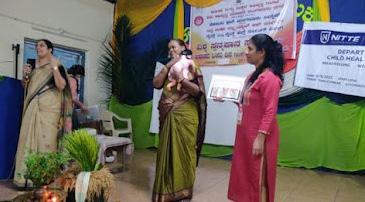
Publications
1. Jacob AM, Pruthvish S, Sastry NB, Kunnavil R, Shankarappa M, Shetty AK. A comparison of nutritional status between children with and without disabilities: A community- based study. J Family Med Prim Care. 2021 Feb;10(2):941-946. doi: 10.4103/jfmpc. jfmpc_1464_20. Epub 2021 February 27. PMID: 34041102; PMCID: PMC8138344.
2. Shetty SS, Kumari NS. Fatty acid desaturase 2 (FADS 2) rs174575 (C/G) polymorphism, circulating lipid levels and susceptibility to type-2 diabetes mellitus. Sci Rep. 2021 Jun 23;11(1):13151. doi: 10.1038/s41598- 021-92572-7. PMID: 34162950; PMCID: PMC8222307.
3. Shetty SS, Kumari S. Fatty acids and their role in type-2 diabetes (Review). Exp Ther Med. 2021 Jul;22(1):706. doi: 10.3892/ etm.2021.10138. Epub 2021 May 2. PMID: 34007315; PMCID: PMC8120551.
4. Rai T, Rai M, Dsa J, et al. Impact of seasonal variation in association with other factors on vitamin D status among Mangalorean population. J Evolution Med Dent Sci 2021;10(09):589-594. "


.png)